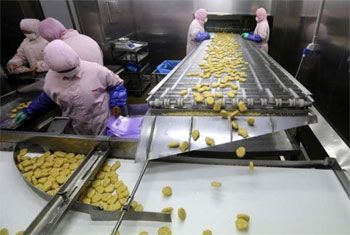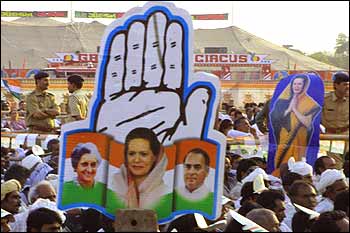Budgetary boost to dairy sector will generate jobs
Dr R S Khanna, Director, Kwality
 Expectations from 2015 budget are perhaps the highest from the Modi regime. It is expected to be pro-poor, pro-farmer and pro-consumer. The budget must give impetus to the core sector of farm production, promote the industry and services ancillary to agriculture and strengthen the agri-knowledge community. If the agriculture and dairy gets boost, it would generate rural jobs, increase food output, control inflation over food prices and impact the consumer positively.
Expectations from 2015 budget are perhaps the highest from the Modi regime. It is expected to be pro-poor, pro-farmer and pro-consumer. The budget must give impetus to the core sector of farm production, promote the industry and services ancillary to agriculture and strengthen the agri-knowledge community. If the agriculture and dairy gets boost, it would generate rural jobs, increase food output, control inflation over food prices and impact the consumer positively.
Dairy sector today is at such a junction of the economy from where it can take wings and become a leader in the domestic and international arena. While during 2013, India turned out to be an important dairy products exporter, 2014 has been a dampener because the international prices of dairy commodities had nosedived. Year 2015 can be better considering the fact that Russia has shown interest in importing cheese, butter, milk powder as well as buffalo meat. Russia is one of the largest importers of dairy commodities in the world. Budget must provide adequate incentives to dairy exporters.
Dairying contributes close to a third of the gross income to an estimated 70 million rural households. Of these about three-fourth are landless, marginal or small farmers and are engaged in milk production. The budget must handhold these small holders by giving them interest free loans for purchase of milking animals and setting up dairy units of 10-15 milking animals. While the National Bank for Agriculture and Rural Development (NABARD) has been active in providing agriculture loans to the farming community on a refinancing basis, the rural commercial banks have been found wanting.
Budget 2015: Complete Coverage
It has been an experience in the past that loans are provided only to the farmers who have provide their land as a collateral guarantee. The landless have generally not been able to get any loans. It is common to note that the landless community of labour depend mainly on livestock farming. The commercial banks are shy of giving loans to the livestock owners and dairy farmers because the banks do not consider the livestock as‘good’ collateral.
The act of the government of open a credit line exclusively for the landless would go a long way in giving boost to dairy farming, poultry farming, and the vagabond community of sheep, goats owners. If this comes true the landless community would have better livelihood and prove to a large contributor to the national GDP. Instead of keeping the animals as a collateral guarantee, it would be a good step if the budget also provides funds for livestock insurance. Insurance policy can be a suitable alternative as a collateral guarantee.
The budget should also make adequate provision for boosting skill development in agriculture and dairying to build efficient infrastructure for agricultural education and research. It is the availability of trained and skilled people that would build the potential for further growth.
Milk is an essential nutritional requirement of human being. Children largely depend on milk for nutrition. Higher milk production, therefore, will also increase the health status of farmers and people at large. Due to several inherent reasons, the cost of milk production is high. Milk is a perishable commodity. Hence, its conversion to products, such as, milk powder, butter and cheese, etc. is necessary. Considering these factors, it is only reasonable that milk products at par with agriculture produce, be exempt from any excise duty, sales tax and similar other taxes.
This gesture of the government would go a long way in accelerating the growth of the Indian dairy industry. To further boost the growth of milk consumption amongst school-going children the government must mandate schools to include bottled milk as a component of the mid-day food scheme. The southern states of Karnataka and Tamil Nadu have been managing these schemes with good impact.
Setting up a dairy plant capable to produce export oriented dairy products like SMP, Whole Milk Powder, cheese, Casein requires huge capital. A plant of this type with handling capacity of 5 lakh litres of milk a day would require an investment of about Rs. 100 crores. The prevailing rate of interest charged by commercial bank is around 12 per cent per annum which makes the operation unviable.
Budget 2015: Complete Coverage
As against his, the agriculture sector is getting term loan at a concessional rate of 4 per cent for investment in processing and value addition. Dairy sector has large potential to generate rural employment. It is, therefore, recommended that dairy industry should be given the status of agriculture sector. This will enable it to avail term loan from banks and financial institutions at a concessional rate of 4 percent which is currently available to agricultural sector only.
The government had provided during 2010-11 budget, an exemption from income tax on the profits of a new dairy plant as well as cold chain and cold storages for a period of five years. This has not helped dairy industry because the dairies have to pay Minimum Alternate Tax (MAT) which is equivalent to 20% of book profits. Normal income tax after factoring various allowable deductions, works out to a little above 22 per cent. Incentive to new dairies, therefore, is quite insignificant. The budget 2015 should consider exemption from payment of MAT to promote setting up of new dairies.
Some states have imposed Mandi Tax and Purchase Tax on milk and milk products. The basic principle of introducing VAT was to absorb all such taxes in VAT and reduce unnecessary taxation. Continuation or reimposition of these taxes negates the very purpose of VAT. Government of India should prevail upon all states to remove all taxes other than VAT on milk and milk products to mitigate the hardships faced by dairy industry.
Granting Infrastructure status to real estate sector will prove to be a boon for long term funding
Anand Gandhi, Director, Sugee Group
 In this Budget, something as simple as granting Infrastructure status to real estate sector will prove to be a boon for long term funding, which is quintessential for building mixed-use township. From the industry to the home buyers; and reduction in interest rates for home loans will provide a boost to the sector while also bridging the gap between demand and supply.
In this Budget, something as simple as granting Infrastructure status to real estate sector will prove to be a boon for long term funding, which is quintessential for building mixed-use township. From the industry to the home buyers; and reduction in interest rates for home loans will provide a boost to the sector while also bridging the gap between demand and supply.
Key Expectations from the budget:
Quick implementation of the Real Estate Regulatory Bill (RERA) enabling the realty market to attract foreign direct investment (FDI)
Faster approvals to expedite development & ensure timely completion of the projects with consequential low prices
Tax advantages for renting out of residential properties that promotes rental realty segment and increases rental supply in the metros
An upward revision of the income tax deduction limit, that is much needed rather than just being a general incentive for buyers
Incentives for green real estate, by the way of subsidies to the developers that promote sustainable real estate development
Provisions need to formulated and modified to stimulate affordable housing benefitting the middle class buyers of the city.
Expectations are around implementation and execution of plans on the Digital India, Make in India and Smart Cities initiatives
C M Menon, Regional Sales Director, Analog Devices India
 The year 2014 has seen some significant announcements from the newly elected government in terms of initiatives aimed to boost manufacturing, improving infrastructure, attracting more investment and improving India’s ranking the ‘ease of doing business’ list of countries.
The year 2014 has seen some significant announcements from the newly elected government in terms of initiatives aimed to boost manufacturing, improving infrastructure, attracting more investment and improving India’s ranking the ‘ease of doing business’ list of countries.
While 2014 has set the stage, expectations from the 2015 budget from an industry perspective, would be around implementation and execution of plans; on the Digital India, Make in India and Smart Cities initiatives.
At this juncture, tangible investments made towards building a strong infrastructure to support and leverage innovative technologies and introducing new reforms that will revive manufacturing – create more manufacturing clusters, promote localisation of products and demand, reducing import duties on electronic components and making importation of these components easy and introducing skilled labour development programs in the country will provide the required impetus to India’s electronics and manufacturing sectors.
Enable Faster Project Approvals, Implement Real Estate Regulatory Bill (RERA)
Gautam Ahuja, Managing Director, Ahuja Constructions
 Enable faster project approvals
Enable faster project approvals
Budget 2015: Complete Coverage
Developers have been trying for a faster project approval process for good reasons and also ensure that real estate remain viable as a business.
Implement Real Estate Regulatory Bill (RERA)
It must now be implemented so that the Indian real estate market becomes attractive for foreign investors.
Fast-Track REITs
Many overseas investment funds have so far abstained from the Indian real estate market because of the lack of regulation, political instability and bureaucratic quagmire. The new government has the opportunity of making Indian real estate more investment-friendly and attractive by introducing a revised tax code.
Encourage FII Participation in Infrastructure
India is still an infrastructure deficient country and needs large investments to help bridge the infra gap. The Union Budget should make more provisions to increase foreign investors’ participation in this sector.
Reduce import duty on food processing machinery to zero for modernisation
M A Tejani, Joint Managing Director, Gits Food Products
 Specific for Food Processing Industry
Specific for Food Processing Industry
To modernise Indian food processing industry, make it world class, it is necessary to import machinery. Hence, import duty should be zero. Not only basic duty but additional duty, countervailing duty, etc. should be exempted.
The Indian Industry already faces huge disadvantage due to adverse exchange rate.
Adding assorted import duties totally around 30 – 35% puts the imported machinery out of the reach of most of the SMEs.
The financial limits for tiny, small & medium industries should also be substantially revised in the view of high inflation. Investment limit for SSI should be increased to Rs. 15 – 20 crore & medium to Rs. 50 crore.
General
There is a desperate need to stimulate consumer demand in the market to boost FMCG Food sales. Approx 60% of the average Indian’s income is spent on food. In the view of high and continuing inflation over last several years & expected to increase, it is extremely necessary to raise the Income Tax exemption limit to at least Rs. 10 lakhs & index it to inflation hereafter & that it rises automatically every year according to the rate of inflation.
Hope that GST is finally implemented; this will be a great boon. It is a rational and logical setup that the government must take.
Likewise, the Income Tax deduction for investments in savings instruments like insurance etc should be increased & inflation indexed.
The allowances to salaried persons like HRA, medical, etc. should be substantially increased bringing in line with current realities & indexed to inflation.
TDS has become complex & a burden. The Government does not seem to realize that it is obtaining free services from tax deductors to collect income tax on its behalf & prevent possible evasion. The Government penalizes the tax deductors severely for delays, errors, etc on the one hand & denies refund to tax deductees for no fault of theirs.
Profession Tax is levied by the state like Maharashtra, which is oppressive because it is applicable to ordinary low-income workers & others. It should be abolished. It was initially introduced as a substitute for Octroi. But octroi continues and so does Profession tax.
Abolish Central Sales Tax. It is greatly hampering interstate trade. ‘C’ forms are issued online for every quarter. Online application has to be made in the 4th month i.e. on completion of quarter. The ‘C’ forms are issued in the 5th month.
Strengthen & expand & reform judicial infrastructure to deliver speedy justice & end the huge backlog of cases. Enormous number of new cases are being filed in courts across the country everyday & backlog is growing alarmingly.









 © 2025
© 2025